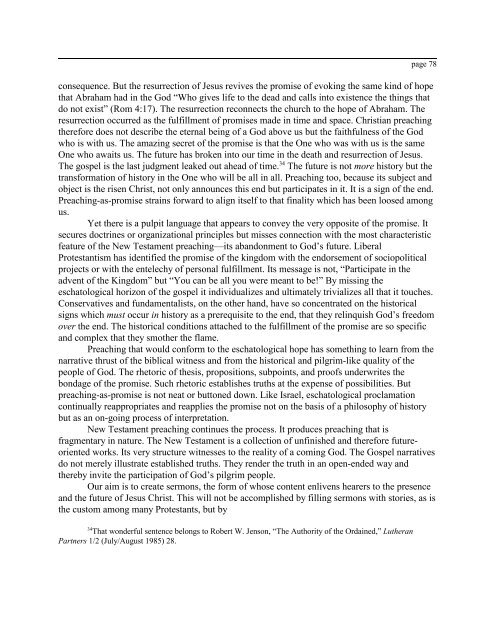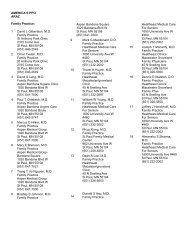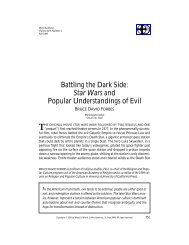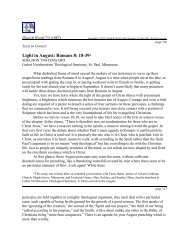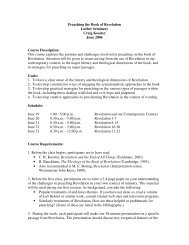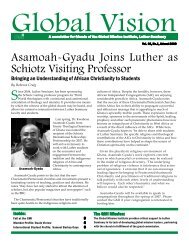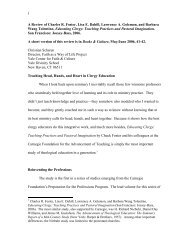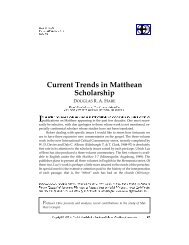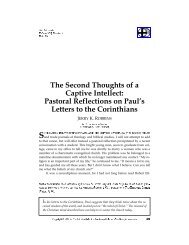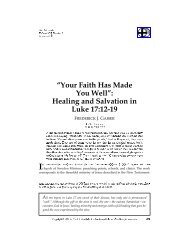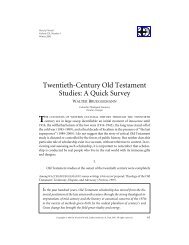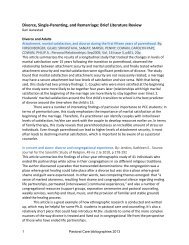Download Article PDF - Word & World - Luther Seminary
Download Article PDF - Word & World - Luther Seminary
Download Article PDF - Word & World - Luther Seminary
- No tags were found...
Create successful ePaper yourself
Turn your PDF publications into a flip-book with our unique Google optimized e-Paper software.
page 78consequence. But the resurrection of Jesus revives the promise of evoking the same kind of hopethat Abraham had in the God “Who gives life to the dead and calls into existence the things thatdo not exist” (Rom 4:17). The resurrection reconnects the church to the hope of Abraham. Theresurrection occurred as the fulfillment of promises made in time and space. Christian preachingtherefore does not describe the eternal being of a God above us but the faithfulness of the Godwho is with us. The amazing secret of the promise is that the One who was with us is the sameOne who awaits us. The future has broken into our time in the death and resurrection of Jesus.The gospel is the last judgment leaked out ahead of time. 34 The future is not more history but thetransformation of history in the One who will be all in all. Preaching too, because its subject andobject is the risen Christ, not only announces this end but participates in it. It is a sign of the end.Preaching-as-promise strains forward to align itself to that finality which has been loosed amongus.Yet there is a pulpit language that appears to convey the very opposite of the promise. Itsecures doctrines or organizational principles but misses connection with the most characteristicfeature of the New Testament preaching—its abandonment to God’s future. LiberalProtestantism has identified the promise of the kingdom with the endorsement of sociopoliticalprojects or with the entelechy of personal fulfillment. Its message is not, “Participate in theadvent of the Kingdom” but “You can be all you were meant to be!” By missing theeschatological horizon of the gospel it individualizes and ultimately trivializes all that it touches.Conservatives and fundamentalists, on the other hand, have so concentrated on the historicalsigns which must occur in history as a prerequisite to the end, that they relinquish God’s freedomover the end. The historical conditions attached to the fulfillment of the promise are so specificand complex that they smother the flame.Preaching that would conform to the eschatological hope has something to learn from thenarrative thrust of the biblical witness and from the historical and pilgrim-like quality of thepeople of God. The rhetoric of thesis, propositions, subpoints, and proofs underwrites thebondage of the promise. Such rhetoric establishes truths at the expense of possibilities. Butpreaching-as-promise is not neat or buttoned down. Like Israel, eschatological proclamationcontinually reappropriates and reapplies the promise not on the basis of a philosophy of historybut as an on-going process of interpretation.New Testament preaching continues the process. It produces preaching that isfragmentary in nature. The New Testament is a collection of unfinished and therefore futureorientedworks. Its very structure witnesses to the reality of a coming God. The Gospel narrativesdo not merely illustrate established truths. They render the truth in an open-ended way andthereby invite the participation of God’s pilgrim people.Our aim is to create sermons, the form of whose content enlivens hearers to the presenceand the future of Jesus Christ. This will not be accomplished by filling sermons with stories, as isthe custom among many Protestants, but by34That wonderful sentence belongs to Robert W. Jenson, “The Authority of the Ordained,” <strong>Luther</strong>anPartners 1/2 (July/August 1985) 28.


